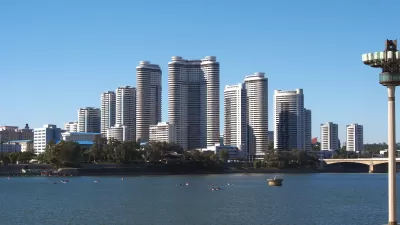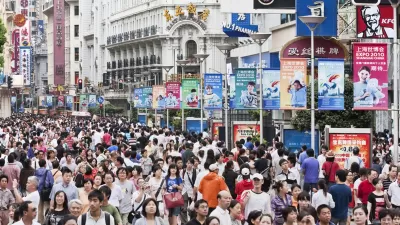While they look clean and green on the drawing board, Asia's planned developments might be nothing more than cloned commercialism set in concrete. By undermining local culture, this 'smart city' approach may also prove unsustainable.

Kris Hartley attacks a recent glut of massive Asian 'smart city' projects: pre-planned and well-branded development ostensibly suited to the global economy.
Like colonial architecture of the past, modern incarnations "frequently overlook the peculiarities of indigenous culture in favour of a commodified landscape designed to serve commercial interests. When thoughtfully considered, the term 'smart city' often proves to be a veil for standardised planning visions that are neither smart nor culturally attuned."
Though they are advertised as connected, sustainable, and clean, Hartley writes that many of these cities "appear to be little more than postmodern takes on Corbusian monumentalism, with broad highways bisecting districts of tower blocks. Furthermore, a critical element is missing: culture."
Design alone, and lip service paid to an aesthetic environmentalism, merely replicates harmful globalizations of the past. For planned cities to truly prosper, "In commercial terms, authenticity is a competitive advantage, providing experiences for citizens and visitors that are absent in universal, commodity-stock developments. Planners on both sides of urban collaborations should therefore be mindful of cultural dimensions, lest the smart city lose its local wisdom."
FULL STORY: Smart cities and the plight of cultural authenticity

Trump Administration Could Effectively End Housing Voucher Program
Federal officials are eyeing major cuts to the Section 8 program that helps millions of low-income households pay rent.

Planetizen Federal Action Tracker
A weekly monitor of how Trump’s orders and actions are impacting planners and planning in America.

Ken Jennings Launches Transit Web Series
The Jeopardy champ wants you to ride public transit.

Driving Equity and Clean Air: California Invests in Greener School Transportation
California has awarded $500 million to fund 1,000 zero-emission school buses and chargers for educational agencies as part of its effort to reduce pollution, improve student health, and accelerate the transition to clean transportation.

Congress Moves to End Reconnecting Communities and Related Grants
The House Transportation and Infrastructure Committee moved to rescind funding for the Neighborhood Equity and Access program, which funds highway removals, freeway caps, transit projects, pedestrian infrastructure, and more.

From Throughway to Public Space: Taking Back the American Street
How the Covid-19 pandemic taught us new ways to reclaim city streets from cars.
Urban Design for Planners 1: Software Tools
This six-course series explores essential urban design concepts using open source software and equips planners with the tools they need to participate fully in the urban design process.
Planning for Universal Design
Learn the tools for implementing Universal Design in planning regulations.
Heyer Gruel & Associates PA
Ada County Highway District
Institute for Housing and Urban Development Studies (IHS)
City of Grandview
Harvard GSD Executive Education
Toledo-Lucas County Plan Commissions
Salt Lake City
NYU Wagner Graduate School of Public Service





























